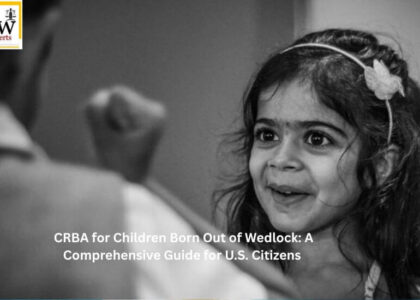The Consular Report of Birth Abroad (CRBA) application is a crucial process for U.S. citizens with children born outside the United States. This document serves as official proof of U.S. citizenship for children born abroad to U.S. citizen parents. However, receiving a denial of your CRBA application can be a daunting experience. In this article, we provide a comprehensive, detailed guide on what to do if your CRBA application is denied, helping you take the right steps to secure citizenship documentation effectively.
Understanding the Reasons Behind Your CRBA Application Denial
The first step after a CRBA application denial is to thoroughly understand the reasons behind the decision. Common grounds for denial of a CRBA application include:
- Insufficient proof of the parent’s U.S. citizenship during the application process
- Failure to establish the child’s biological relationship to the U.S. citizen parent
- Lack of adequate documentation proving the parent’s physical presence or residence in the United States as required by law
- Incomplete or inconsistent paperwork submitted with the CRBA application
- Failure to meet statutory requirements under U.S. immigration law governing CRBA eligibility
Carefully reviewing the denial notice from the consulate or embassy will clarify why the CRBA application was denied, guiding you in preparing your next move.
Step 1: Request a Detailed Explanation or Administrative Review of Your CRBA Application
If the reasons for the CRBA application denial are unclear or vague, it is advisable to request a detailed written explanation or an administrative review from the issuing consulate or embassy. This can help identify specific deficiencies or misunderstandings regarding your CRBA application.
A comprehensive explanation allows you to address any errors or omissions in your original submission, increasing the likelihood of a successful appeal or reapplication.
Step 2: Gather Additional Documentation for Your CRBA Application
Denials often result from insufficient or incomplete documentation. To strengthen your CRBA application resubmission or appeal, you should gather:
- Proof of U.S. citizenship of the parent (e.g., U.S. passport, naturalization certificate)
- Evidence of the child’s biological relationship to the U.S. citizen parent, such as birth certificates or hospital records
- Proof of the parent’s physical presence in the United States for the required period prior to the child’s birth (e.g., employment records, school transcripts, tax returns)
- Any affidavits or notarized statements supporting the CRBA application claims
Ensure all documentation is official, translated if necessary, and directly linked to the CRBA application requirements.
Step 3: File a Motion for Reconsideration or Appeal Your CRBA Application Denial
Many consulates permit applicants to file a motion for reconsideration or appeal when a CRBA application is denied due to errors of fact or law. This process requires:
- A formal written statement requesting the reconsideration of your CRBA application denial
- Submission of new or previously omitted evidence supporting your eligibility
- Detailed legal arguments referencing the Immigration and Nationality Act (INA) or other relevant statutes
If available, this appeals process can be critical to overturning a CRBA application denial without the need to start over completely. Hiring an immigration attorney experienced with CRBA cases can greatly enhance your chances.
Step 4: Utilize DNA Testing for Your CRBA Application if Parentage is Contested
In cases where the CRBA application denial arises due to doubts about biological parentage, DNA testing can provide definitive proof. Accredited DNA tests recognized by U.S. consulates and embassies are generally accepted as valid evidence.
Follow consulate-specific protocols for DNA testing, including maintaining proper chain-of-custody documentation, to ensure the results are accepted during your CRBA application reconsideration or reapplication.
Step 5: Submit a New CRBA Application with Corrected Documentation
If an appeal or motion for reconsideration is denied or unavailable, you may need to submit a new CRBA application addressing the reasons for the previous denial. When doing so, ensure your new CRBA application:
- Contains all required documents with any deficiencies corrected
- Includes a cover letter explaining the previous denial and steps taken to remedy issues
- Is filed within any deadlines specified by the consulate or embassy
A carefully prepared new CRBA application significantly improves the chances of approval.
Step 6: Explore Alternative U.S. Citizenship Documentation Options if CRBA Application Remains Denied
If, despite all efforts, your CRBA application continues to be denied, consider alternative methods to establish your child’s U.S. citizenship, such as:
- Applying for a U.S. passport for your child using other proof of citizenship
- Filing for a Certificate of Citizenship via USCIS by submitting Form N-600
- Consulting with legal experts to explore other citizenship pathways, including derivative or naturalization claims
These alternatives might require additional time and documentation but can ultimately secure the child’s U.S. citizenship status.
Step 7: Seek Expert Legal Assistance for Your CRBA Application Challenges
Navigating a CRBA application denial is often complex and requires a detailed understanding of immigration law and consular procedures. We strongly recommend:
- Consulting an experienced immigration attorney who specializes in CRBA applications and citizenship issues
- Engaging with non-profit organizations or advocacy groups that assist families facing citizenship documentation challenges
- Keeping comprehensive records of every communication, application, and official decision related to your CRBA application
Professional guidance ensures your CRBA application is handled correctly and maximizes your chances of success.
Step 8: Stay Patient and Persistent Throughout the CRBA Application Process
The process of overcoming a CRBA application denial can be long and taxing. It is essential to:
- Monitor the status of your CRBA application or appeal regularly
- Respond promptly to any requests from the consulate or USCIS for additional information
- Keep all documentation organized and accessible
- Remain committed and patient while navigating bureaucratic procedures
Persistence is key to successfully securing your child’s U.S. citizenship through the CRBA application process.
📞 Contact SJ Law Experts Today
Trust SJ Law Experts to handle your case with professionalism, empathy, and precision.
📌 Schedule Your Legal Consultation:
📱 WhatsApp/Phone: +92 (0) 335-411-2288
📧 Email: SJLawExperts@gmail.com
📍 Office: No. 1, First Floor, Al Anayat Mall, Above Faysal Bank, G-11 Markaz, Islamabad, Pakistan
Conclusion
In summary, when faced with a CRBA application denial, it is vital to:
- Fully understand the reasons for the denial
- Collect comprehensive evidence supporting your CRBA application
- Utilize motions for reconsideration or appeals where possible
- Leverage DNA testing to confirm parentage when necessary
- Submit a new CRBA application if required
- Explore alternative citizenship documentation paths
- Engage professional legal assistance
- Maintain patience and persistence throughout
Following these steps systematically will enhance your ability to overturn a CRBA application denial and obtain citizenship documentation for your child born abroad.





